Living with dignity is the best way to commemorate the 228 Incident, President Tsai Ing-wen (蔡英文) said yesterday in a speech at the 228 Incident Memorial Ceremony in Tainan.
The government’s 76th anniversary memorial ceremony in commemoration of the 1947 incident was held in Tainan 228 Memorial Park.
It was one of many events, including ceremonies, movie screenings, parades and silent commemorations, held throughout the country to mark the occasion.
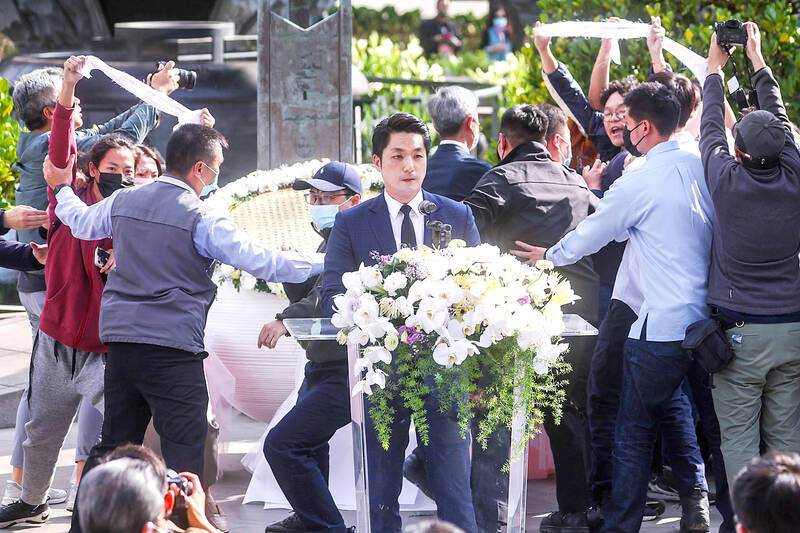
Photo: CNA
The theme of this year’s national ceremony was “justice comes together, bravery goes on,” and began with Tsai presenting a flower wreath at the memorial for victims of the massacre.
She also presented a reputation restoration certificate to the son of victim Su Shui-mu (蘇水木), and expressed her sympathy to the families of victims of the violent political crackdown that started in response to protests of the killing of a bystander in Taipei on Feb. 27, 1947.
Tsai said that transitional justice is running against time, and since 2016, the government has systematically achieved progress on several objectives, including passing five laws and forming the Cabinet’s Transitional Justice Commission in September last year, to accelerate the integration and supervision of cross-ministerial tasks related to transitional justice.
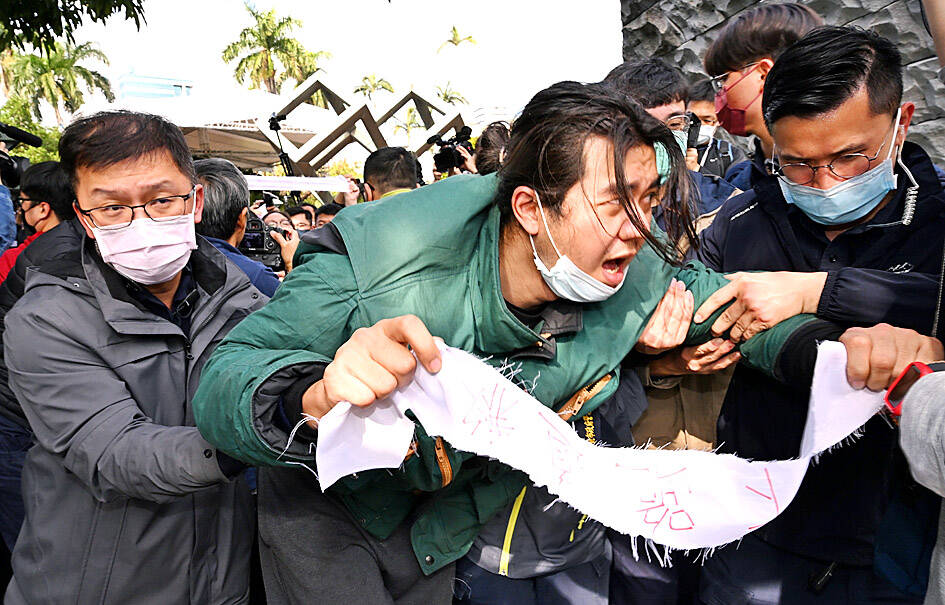
Photo: Liu Hsin-te, Taipei Times
The five laws are the Act Governing the Settlement of Ill-gotten Properties by Political Parties and Their Affiliate Organizations (政黨及其附隨組織不當取得財產處理條例), the Organizational Act of the National Human Rights Museum (國家人權博物館組織法), the Act on Promoting Transitional Justice (促進轉型正義條例), the Political Archives Act (政治檔案條例) and the Act to Restore Victims’ Rights Infringed by Illegal Acts of the State During the Period of Authoritarian Rule (威權統治時期國家不法行為被害者權利回復條例).
Transitional justice has led to the redress of 5,983 wrongful convictions, the removal of the criminal stigma from victims of political persecution and the discovery and examination of 7,572 political archive documents, she said, adding that the government would continue to collect and declassify political archives for open research.
A draft amendment to the Political Archives Act was promulgated yesterday and would hopefully be enacted within a year, making the scope of the act more complete, Tsai said.
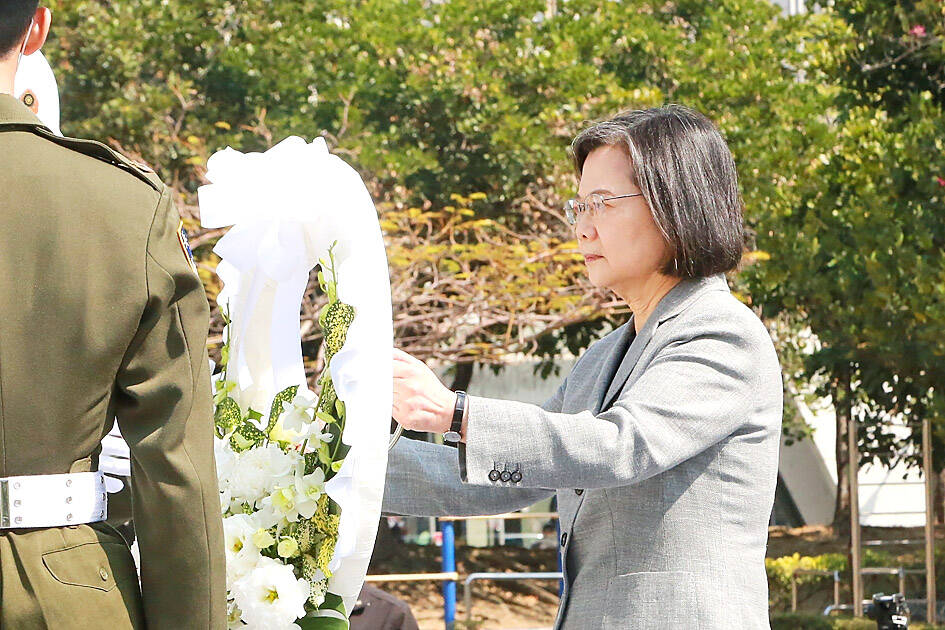
Photo courtesy of the Tainan City Government
The government has designated 42 sites where injustices were committed and is planning to transform them into educational sites commemorating human rights and history, she said.
The educational framework for action on national transitional justice was recently approved, marking the first time that the 228 Incident has been included in an education framework, she said.
The Tainan 228 Memorial Monument symbolizes people’s suffering under authoritarian rule, and it is across from Tainan City Hall, reminding the government not to forget that history, she added.
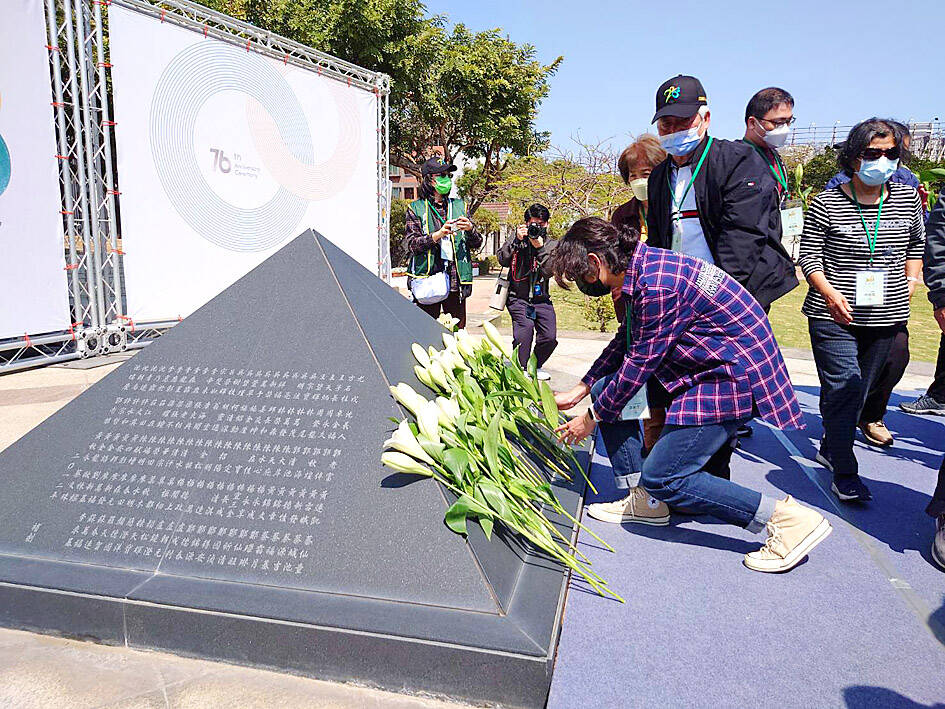
Photo: Hung Jui-chin, Taipei Times
Tang Te-chang Memorial Park (湯德章紀念公園) in Tainan commemorates Tang’s bravery in sacrificing himself to protect other city residents by refusing to hand over a list of political suspects, which inspired many people, Tsai said.
With the opening of the Tainan 228 Memorial Museum in September last year, people can learn about Tang and many heroes of that era, reminding the government not to repeat the same mistakes, she said.
Quoting a line from the film A City of Sadness (悲情城市), about a family living through the 228 Incident, Tsai said: “You must live with dignity. Father is not guilty.”
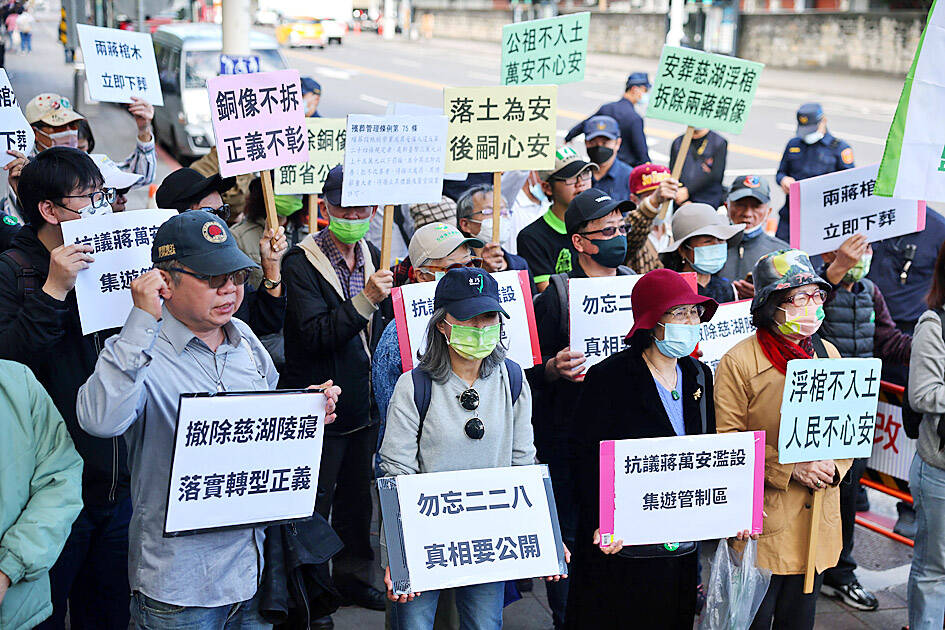
Photo: CNA
She said that many people have been moved by that scene, as the heroes and victims of the 228 Incident sacrificed themselves, but still chose dignity not only for themselves, but also for their family and friends.
At the Taipei City Government’s annual memorial ceremony at 228 Peace Memorial Park yesterday afternoon, more than a dozen protesters interrupted Taipei Mayor Chiang Wan-an’s (蔣萬安) speech, calling him a murderer and demanding that he “kneel down and apologize.”
Chiang is a purported great-grandson of former president Chiang Kai-shek (蔣介石), who historical archives indicate ordered the brutal crackdown in 1947.
As Chiang Wan-an began his speech, protesters holding banners ran toward him from behind. Security quickly intervened and Chiang Wan-an continued his speech.
“As Taipei mayor, I give my sincere apology about the cigarette confiscation incident that occurred in front of the Tianma Tea House (天馬茶房) in Taipei’s Dadaocheng (大稻埕) area 76 years ago, which led to the historical pain of the 228 Incident across the nation,” he said, adding that the government must learn a lesson from history.
Chiang Wan-an said that former presidents Lee Teng-hui (李登輝) and Ma Ying-jeou (馬英九) have apologized for the mistake, and that they had both been Taipei mayor and deeply felt the pain of Taipei residents and Taiwanese, and as their successor, he also feels that pain.
Taiwan went through authoritarian rule and transitioned into a democracy, which is a remarkable achievement for ethnic Chinese in the region, he said, adding that he would work hard to protect democracy throughout his life, and make Taipei a place that embraces democracy and has a peaceful future filled with love, tolerance and respect.

CHAOS: Iranians took to the streets playing celebratory music after reports of Khamenei’s death on Saturday, while mourners also gathered in Tehran yesterday Iranian Supreme Leader Ayatollah Ali Khamenei was killed in a major attack on Iran launched by Israel and the US, throwing the future of the Islamic republic into doubt and raising the risk of regional instability. Iranian state television and the state-run IRNA news agency announced the 86-year-old’s death early yesterday. US President Donald Trump said it gave Iranians their “greatest chance” to “take back” their country. The announcements came after a joint US and Israeli aerial bombardment that targeted Iranian military and governmental sites. Trump said the “heavy and pinpoint bombing” would continue through the week or as long

TRUST: The KMT said it respected the US’ timing and considerations, and hoped it would continue to honor its commitments to helping Taiwan bolster its defenses and deterrence US President Donald Trump is delaying a multibillion-dollar arms sale to Taiwan to ensure his visit to Beijing is successful, a New York Times report said. The weapons sales package has stalled in the US Department of State, the report said, citing US officials it did not identify. The White House has told agencies not to push forward ahead of Trump’s meeting with Chinese President Xi Jinping (習近平), it said. The two last month held a phone call to discuss trade and geopolitical flashpoints ahead of the summit. Xi raised the Taiwan issue and urged the US to handle arms sales to

BIG SPENDERS: Foreign investors bought the most Taiwan equities since 2005, signaling confidence that an AI boom would continue to benefit chipmakers Taiwan Semiconductor Manufacturing Co’s (TSMC, 台積電) market capitalization swelled to US$2 trillion for the first time following a 4.25 percent rally in its American depositary receipts (ADR) overnight, putting the world’s biggest contract chipmaker sixth on the list of the world’s biggest companies by market capitalization, just behind Amazon.com Inc. The site CompaniesMarketcap.com ranked TSMC ahead of Saudi Aramco and Meta Platforms Inc. The Taiwanese company’s ADRs on Tuesday surged to US$385.75 on the New York Stock Exchange, as strong demand for artificial intelligence (AI) applications led to chip supply constraints and boost revenue growth to record-breaking levels. Each TSMC ADR represents

State-run CPC Corp, Taiwan (CPC, 台灣中油) yesterday said that it had confirmed on Saturday night with its liquefied natural gas (LNG) and crude oil suppliers that shipments are proceeding as scheduled and that domestic supplies remain unaffected. The CPC yesterday announced the gasoline and diesel prices will rise by NT$0.2 and NT$0.4 per liter, respectively, starting Monday, citing Middle East tensions and blizzards in the eastern United States. CPC also iterated it has been reducing the proportion of crude oil imports from the Middle East and diversifying its supply sources in the past few years in response to geopolitical risks, expanding